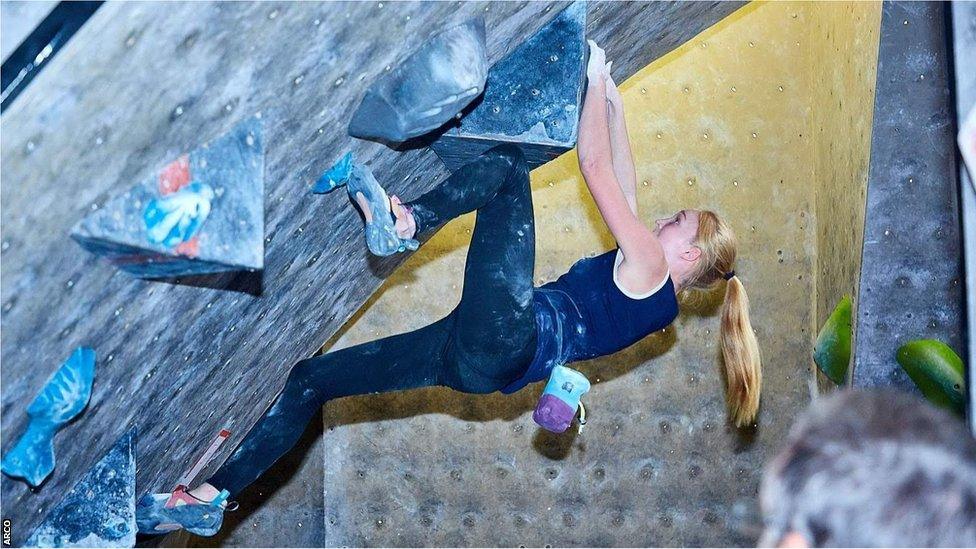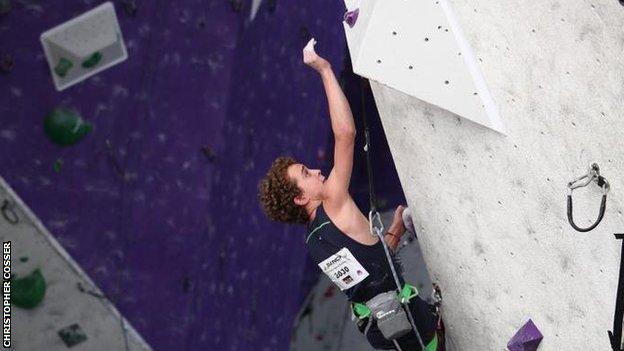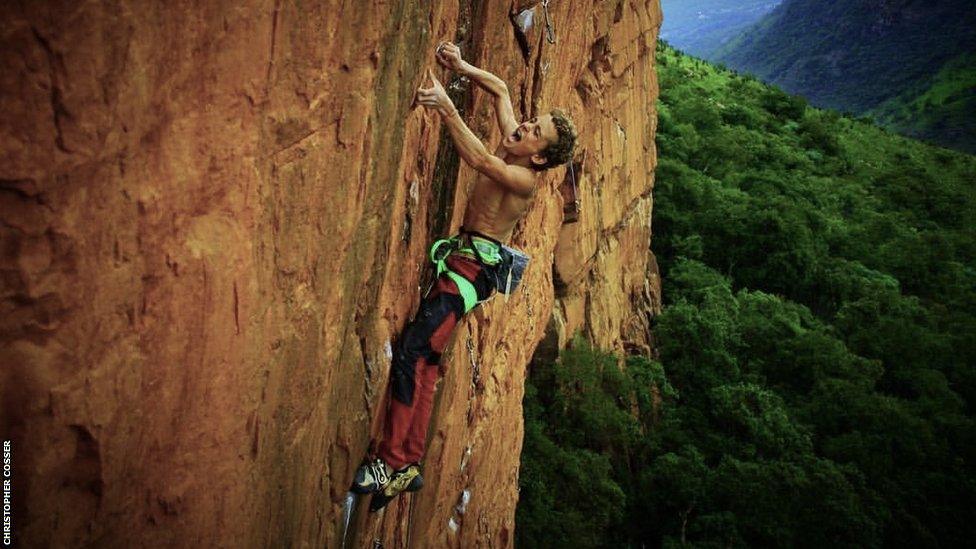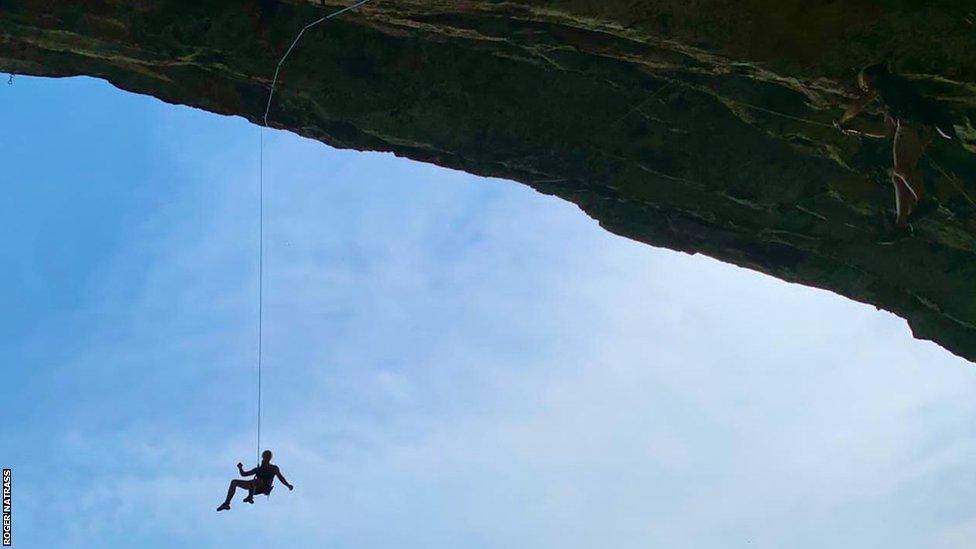Tokyo 2020: Africa's Olympic climbing hopefuls aim to inspire the next generation
- Published

South African climber Erin Sterkenburg in action on a climbing wall
Africa's two Olympic representatives in the sport of climbing, which makes its debut at the Tokyo Games later this year, are hoping they can inspire the continent's next generation to take up the sport.
The duo are from South Africa with 20-year-old Christopher Cosser in the men's event and 17-year-old Erin Sterkenburg in the women's competition.
Both athletes are desperate to see the sport develop across Africa after a total of just 22 climbers from two nations (20 from South Africa and 2 from Uganda) took part in December's qualifiers.
Cosser finished clear of 13 other male competitors while Sterkenburg beat 7 climbers to clinch her Olympic spot
The Covid-19 pandemic almost certainly affected entries with 500 people climbing competitively across the continent.
However as it stands only Algeria, Botswana, Cameroon, Mauritius, Rwanda, Senegal, South Africa and Uganda are registered with the sport's global body, the International Federation of Sport Climbing.
"I am hoping my participation will be able to grow the African climbing community as a whole," rallied Cosser.
"It is not going to be a quick fix but hopefully within the next 10 years we will have more climbing gyms, more kids competing and hopefully it can be more accessible for them and no longer make the cost effects a factor."

Sterkenburg is also hopeful The Games are a springboard for African climbing.
"A lot of people don’t know climbing as a sport but after these Olympics, a lot more people will be interested because they’ll see it on TV," she added.
"Then the interest will spark in the sport because we always want new people -that’s what keeps us going."
Like many athletes around the world, the duo are continuing to train despite the ongoing restrictions caused by coronavirus.
During the lockdown last year in South Africa, Sterkenburg and Cosser had to make do with backyard contraptions to keep fit.
Now, with restrictions eased they are getting training into full gear and hope their dream of an historic Olympic participation will be realised.
Starting young

Christopher Cosser in action outdoors
The two athletes were inspired in different ways to take up the sport at a young age - for Cosser it was film and for Sterkenburg it as school.
On his 12th birthday one of Cosser's gifts was the movie Progression, which follows the life of climbers and their determination to conquer their challenges.
The film may only have been 90 minutes long but it ignited a passion in him for the sport that has dominated the South African’s life ever since.
"I remember watching the professional climbers and just thinking, 'I need to try this – this looks amazing'," Cosser told BBC Sport Africa.
Fast forward almost a decade and that curiosity has paid off handsomely, with the 20-year-old on the brink of history.
With the delayed Olympics due to start on 23 July he will be among the 40 climbers competing the sport makes its debut at the Games.
"I was very emotional when the results came in and when I found out that I’d won the competition," he said from Johannesburg.
"I am very excited to represent not only my country but also our sport. It’s a new sport and to be a part of that is a really big thing."

Erin Sterkenburg being lowered after completing a climb at the Galaxy Wall in Shongweni, South Africa
Like her older colleague qualification for Sterkenburg, who got into the sport in grade eight because her school has a climbing wall, was a dream come true.
"We’ve always watched the Olympics in our family whenever it’s on, so it’s going to be crazy to be there and be a part of all of it," Sterkenburg told BBC Sport Africa.
"I am excited to stay in the Olympic village – that is a big thing for me."
A sport that involved scaling heights might be a bit scary for some and when Sterkenburg began practicing the sport three years ago, her mother was far from enthusiastic.
"My dad was pretty much ok but my mom was a bit concerned, and she’d ask – ‘are you sure you are not going to fall and hurt yourself or something?'," she recalls.
She was determined to prove her sport is safe, so she kept competing in school events and the more her mother watched her, the more she got used to the idea that her daughter would be okay.
Sterkenburg's only real concern is another that comes with being an elite climber.
"My hands are always calloused and people tell me – 'oh your hands are so ugly' – but I deal with it," she explains.
What is sport climbing?
For climbing's Olympic debut in Tokyo, competitors will compete in just a single event which will test the athletes in three disciplines: bouldering, lead and speed climbing.
In future Olympics, many athletes hope to see the disciplines separated with medals being awarded for each one.
All the events are held on man made walls that can be altered depending on the discipline.
Speed Climbing: tests the speed of the climber on a 15-meter wall competing on parallel routes. The fastest time wins. The current world record is 5.48 seconds.
Bouldering: tests the athletes' power, technique and ability to overcome 'problems' by picking the best route possible, with a maximum height of four meters and safety mats below. The athlete who solves the most problems with the lowest attempts wins the category.
Lead Climbing: is all about height, endurance, and strategy. Athletes are secured by a rope on an overhanging route with a six-minute time limit. The athlete who reaches the highest point wins the category.